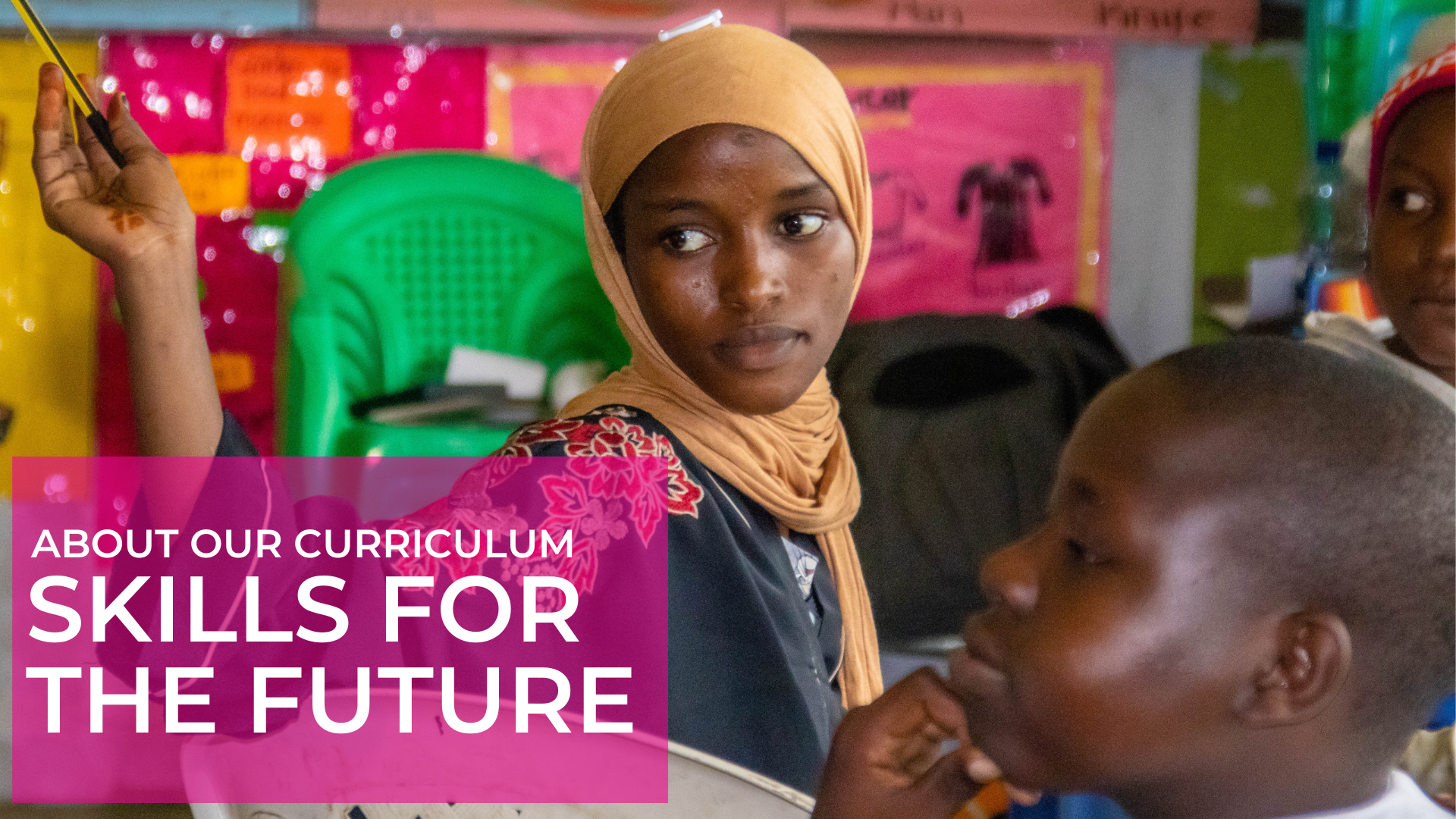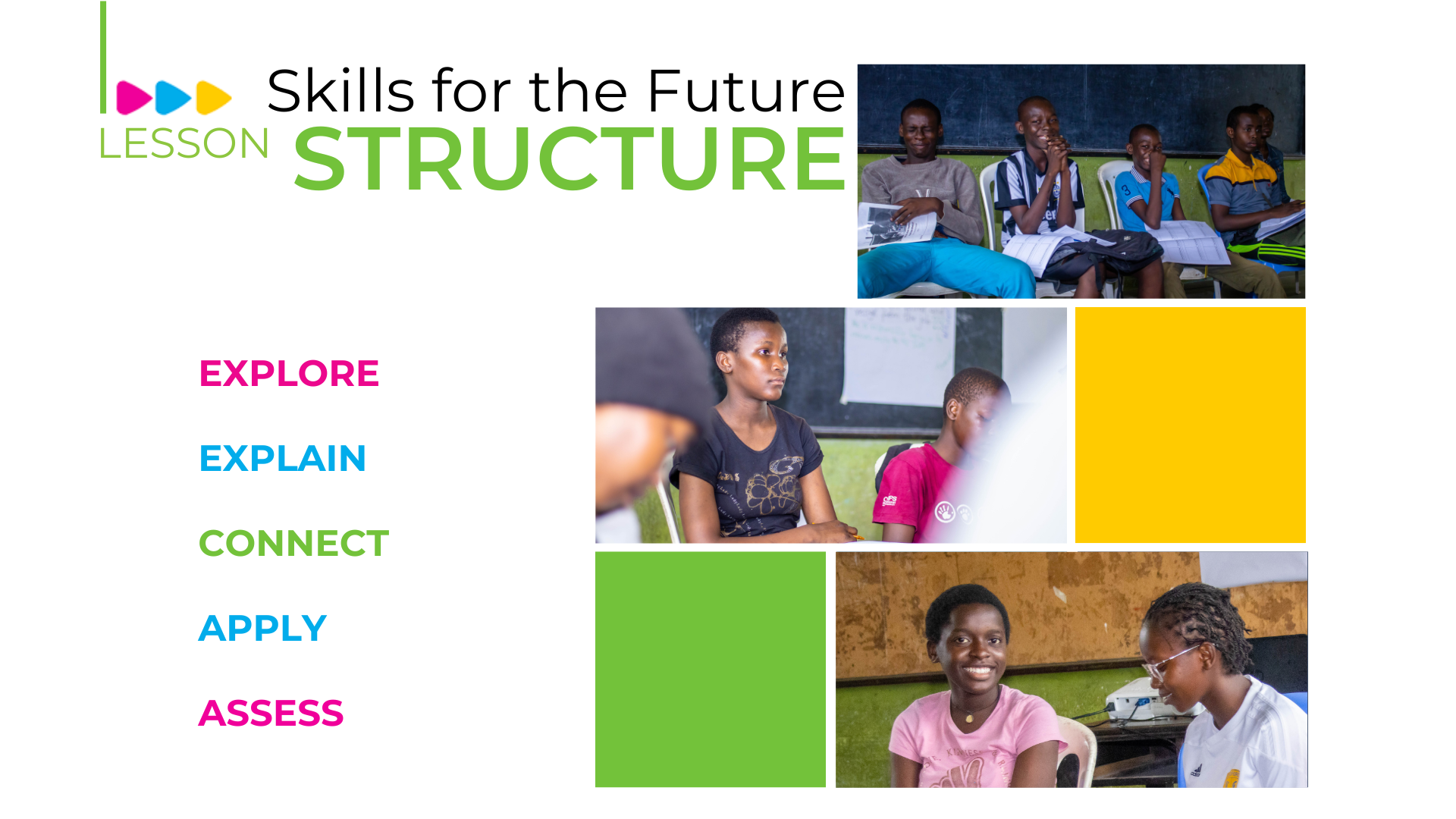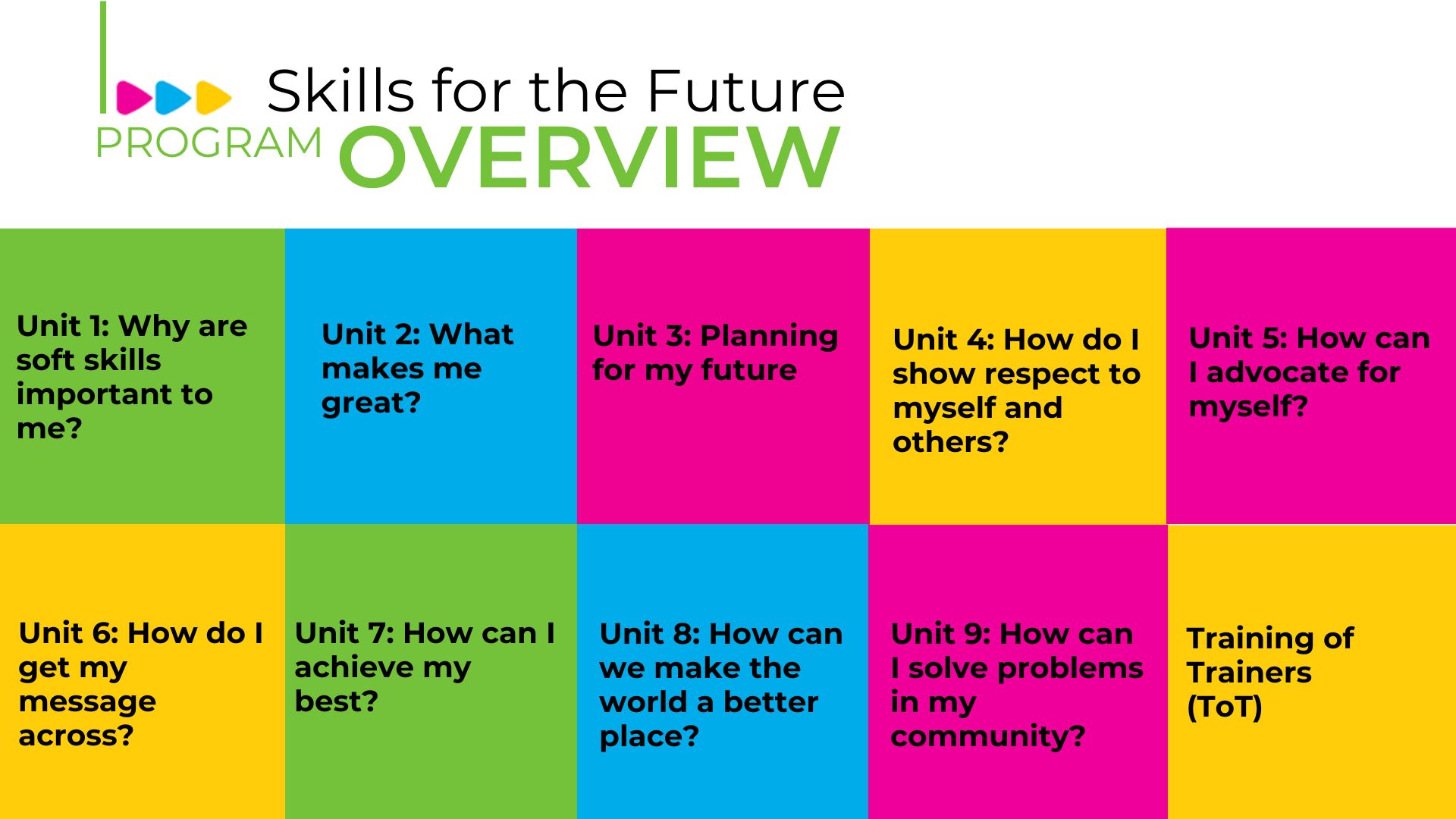About Our Curriculum

Our Skills for the Future program aims to assist young people to complete school and enter the workforce ready to excel in their careers and engage as responsible citizens in their communities.
The curriculum focuses on ensuring that our students are efficiently equipped with knowledge and soft skills that are relevant in the 21st century. We use practical 'activity-based' learning to develop competency in Communication, Collaboration, Problem Solving, Emotional intelligence, Responsibility, and their accompanying sub-competencies to prepare students for life during and after school.
Program Overview
- Unit 1: Why are soft skills important to me?
- This unit introduces students to Skills for the Future and establishes their baseline skills levels across 5 core competencies: collaboration, communication, problem solving, emotional intelligence, and responsibility.
- Unit 2: What makes me great?
- Participants will widen their self awareness by identifying their strengths and ethics. As they do so, they will build their confidence to tackle challenges in school.
- Unit 3: Planning for my future
- Armed with a growth mindset, participants in this unit will practise critical thinking and decision making to identify opportunities for growth and reflect on their career options.
- Unit 4: How do I show respect to myself and others?
- Participants will strengthen their self management, social awareness and conflict management skills, as they explore healthy friendships and the importance of showing tolerance towards others.
- Unit 5: How can I advocate for myself?
- Participants will gain accurate information about reproductive health and use this knowledge to practise healthy decision making and effective verbal communication that safeguards their futures.
- Unit 6: How do I get my message across?
- In this unit, participants will cultivate their creative thinking skills as they practise using written communication to tell their stories.
- Unit 7: How can I achieve my best?
- Participants will learn why proactivity and productivity skills are important as they set goals to strengthen their academic performance and prepare for success in their future careers.
- Unit 8: How can we make the world a better place?
- In this unit participants gain knowledge and teach others about the UN’s Sustainable Development Goals. In the process, they practise teamwork, digital literacy and presentation skills.
- Unit 9: How can I solve problems in my community?
- This capstone unit engages participants in human-centred design to identify a problem in their community and create a solution that meets that need. To succeed students will utilize their collaboration, communication, problem solving, emotional intelligence, and responsibility skills.
- Training of Trainers for Effective Delivery
- This programme prepares trainers with the facilitation skills, topic knowledge, and practice needed to effectively implement Hatua’s Skills for the Future curriculum.
How does learning happen?
- Participants are introduced to content and then asked questions while the trainer fosters the discussion, takes steps to enhance the experience for the learners, and gives suggestions.
- Facilitators do not do the work for the group; instead, they guide learners toward a specific learning outcome.
- Lessons in the curriculum are structured to enhance this approach. A pair of trainers facilitate a 2-hour session with groups of 15-25 students to ensure effective student engagement.
Lesson structure

Explore: Students explore the core objective of the lesson in an interactive and student-centred approach.
Explain: Students share learnings from the exploration to define the focus of the lesson. The facilitator provides key information about the topic.
Connect: Students connect the information shared to their own lives and experiences. They may also connect to content they have already learned.
Apply: Students apply learning through practice. This could include scenarios, role plays, presentations, etc.
Assess: The Facilitator uses a tool to assess overall student learning of the objectives. Students could be assessed individually or through group work.
How we measure learning

| Competency | Definition | Sub Comp 1 | Sub Comp 2 | Sub Comp 3 | Sub Comp 4 |
|---|---|---|---|---|---|
| Collaboration | Working together with one or more people to complete a task or achieve a desired goal. Managing conflict when working with others. Learning how to lead and encourage others. | Teamwork - Shared Responsibilities - Participation (role and responsibility) - Giving and receiving feedback |
Conflict Management - Emotional management (self and others- as it relates to teamwork) - Conflict resolution |
Leadership - Create shared norms/goals - Encourage others (participation, positivity) - Hold others accountable - Builds consensus - Lead by example |
|
| Communication | The exchange of information through speaking or writing. The ability to use communication to effectively interact with others and convey your thinking as well as react to communication of others. | Verbal Communication - Audibility - Clear and concise language - Assertive communication |
Written Communication - Planning - Literary Techniques (Clear & Concise, Show Don't Tell) - Editing - Types of writing (5 paragraph essay, memoir, slides, letter/email, Research writing including paraphrasing, quote, citing sources) |
Active Listening - Being attentive - Eye contact - Non-verbals and body language - Conveying emotions that match the situation - Asking good questions - Note taking - Summarizing and restating |
Presentation - Preparation - Confidence - Use of visual aids - Vocal variation - Movement |
| Emotional Intelligence | The ability to develop self awareness to understand your emotions, strengths and abilities to help you interact with others. The ability to understand, use, and manage your own emotions in positive ways to relieve stress, communicate effectively, empathize with others, and overcome challenges. | Self-Awareness - Self assessment - Self awareness - Self esteem |
Self-Management - Managing Emotions - Achievement Orientation |
Social Awareness - Respect for others - Empathy - Deconstructing Bias |
|
| Problem Solving | The process of finding solutions difficult or complex problems by using a variety of strategies to come up with ideas and evalaute them. | Critical Thinking - Gather information from credible sources - Analyse information - Draw conclusions |
Creative Thinking - Idea generation (visualization, Brainstorming - Design Thinking - Resourcefulness |
Decision Making - Define decision - Evaluate options - Make decisions that best align with goals & values - Assess decision - Take responsibility for impact of decision |
|
| Responsibility | The state of being accountable and having good judgement to make decisions of their own that align with their values and goals. The ability to manage their time towards those goals. | Productivity - Goal Setting - Prioritization - Time management (using calendars) - Efficiency |
Proactivity - Thinking ahead - Taking Initiative - Asking for help |
Ethics - Integrity - Making amends - Service to others |
Conscientiousness - Self-Disipline - Dependablity - Delivering high quality work |

